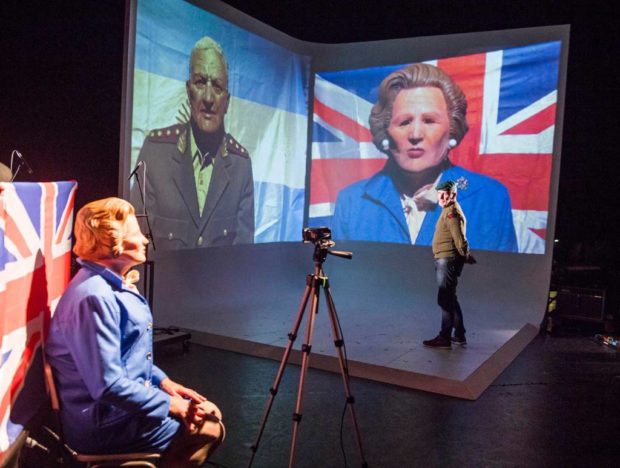You have no items in your cart. Want to get some nice things?
Go shopping
There is a theory that every seven or ten years we become completely new people. None of our cells are the same: they have all been replaced over that period. Except the neurons in the cerebral cortex. Those last our whole lives.
Minefield is back a little over a year after it opened in Brighton at the Corn Exchange and at the Royal Court in London, where it is playing again today. It is a strange and poignant show, about war and memory. And renewal. It is not played by actors but by six veterans of the Falklands War, three who fought for Britain and three who fought for Argentina. They can’t speak each other’s language so the dialogue is split: half in English, the other half in Spanish. The music, however, is mainly in English because one of the Argentinian veterans has a Beatles revival band.
Lola Arias’s play, like her The Art of Making Money (2013), cast with beggars, prostitutes and street performers from Bremen, or Melancolia y Manifestaciones (2012) about the Argentinian playwright and director’s mother, straddles the no man’s land between reality and fiction. It’s an exploration of memory, collective, individual, national – but it’s also a good story. At the beginning of the play each veteran remembers how he ended up in the army. Some like Gabriel had the bad luck to come of age in a country under a military dictatorship. Others like Sukrim the Gurkha had no greater ambition than to be selected by the British Army.
Lola Arias, as director, has a light touch. She lets the men be but they are framed by the urgency of their tale of war. They are all grey now, different, thirty-five years later. One is an iron man; one is a psychologist. What is left of their young selves? Better tell the story now: quick, before it’s too late.
Arias keeps up the pace. As a prelude to the action, the entire stage is covered with projections of Argentinian front pages during the war. From the optimistic beginnings (“We’re still winning”) or a close-up of Pope John Paul II cheering for Argentina, to the timid headlines a few months later (“Was there food? Did they have the right clothes?”), they didn’t talk of defeat. Perhaps they weren’t allowed to. In any case they didn’t need to. The title of the play refers to a terrible scene where Argentinians are blown up stepping accidentally on their own mines. It’s a grieving mother who wrote those last headlines.
The original Royal Marine who was featured on the front page of all the papers in the UK with his arms up, surrendering to the Argentinian army after they invaded the Falklands, is on stage. His name is Lou. He’s a special educational needs teacher. He’s fifty-nine years old. The first Lou ends up on the floor of an aircraft, unsure if he’s about to be dumped in the South Atlantic sea when the plane lands; the British prisoners are left in Uruguay. When the local British consul checks them into a hotel, they go to the bar and sign the bills, “Margaret Thatcher, Margaret Thatcher.”
Margaret Thatcher in a Spitting Image-style mask sends him and the rest of the British Army back to reclaim the Falklands. Two or three years later, we see the second Lou, in a documentary about the war: a man he calls the “emotional Lou”. A man who cried on film when he remembered an Argentinian wounded soldier who died in his arms. “He started speaking to me in English… he was telling me, you know, that he didn’t know why he was… Why we were fighting either.”
I was a school girl in Port-au-Prince when the Falklands War took place and although I’ve been living in London for years, nobody talks about it. The children don’t learn about it at school, and it was nothing more to me than trivia – something for Mastermind or University Challenge.
Still, when at the end of the play the veterans get together and perform a heavy metal song and shout at the audience “Have you ever been to war?”, I got it. No, I haven’t been to war. I haven’t killed anybody. I haven’t watched men die. The price of war is the same, whether the war is famous or forgotten, in English or in Spanish.
But we all need to renew ourselves. Sukrim closes the play with the reading of a poem from a notebook in Nepalese. We are offered no subtitles, no translation. Yet just like Marcelo, the Argentinian heavy mortar man turned gardener, painter and iron man explains at the beginning: “Somehow we understood each other.”
After the run at London’s Royal Court Theatre (Nov 2-11), Minefield goes on tour across the UK, playing the Attenborough Centre for the Creative Arts, Brighton (Nov 15-17); the Northern Stage, Newcastle (Mar 22-24 2018); the York Theatre Royal (Mar 28, 29, 31 2018); the Millennium Centre, Cardiff (Apr 5-7 2018); and HOME, Manchester (Apr 12-14 2018).
About Isabelle Dupuy
Isabelle Dupuy is a writer based in London. She is currently working on a novel "Living the Dream"




